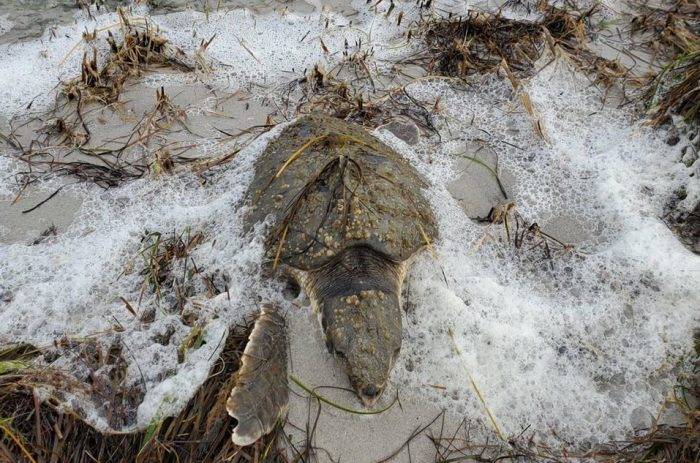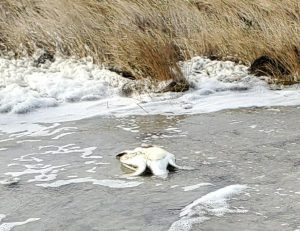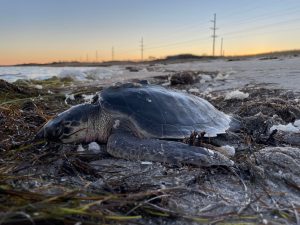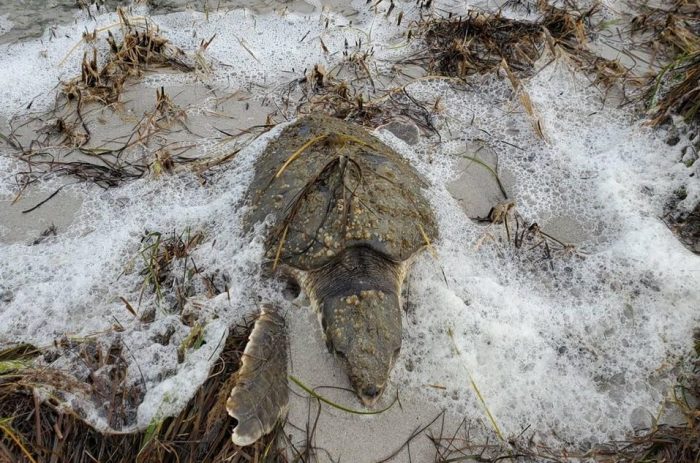
The recent cold spell over the holidays gave many islanders a great excuse to stay at home with their family and friends, but Hatteras Island’s N.E.S.T. (Network for Endangered Sea Turtles) volunteers were out in the elements all weekend long.
That’s because with the plummeting temperatures, a staggering number of cold-stunned sea turtles were recovered along the beaches of Hatteras and Ocracoke Islands, and a total of 202 live sea turtles have been found since December 19, which is more than the past two winter seasons combined.
“This is the most severe event since 2016, when we had an unprecedented 600 sea turtles in the month of January,” said longtime Hatteras Island N.E.S.T Coordinator Frank Welles. “In the past 12 or so years I’ve been doing this, we never had had an event like this around Christmas, but we sure did this year.”
Frank Welles was out of town for the holiday, but he was on the phone for hours on Christmas Eve and Christmas Day, when temperatures reached below-freezing levels. “Luckily, I have a very tolerant family,” he said.

Karen Clark of the N.C. Wildlife Resources Commission, (and Welles’ co-coordinator for recovering sea turtles and transporting them to the STAR Center in Manteo), was also out of town, as was about half of N.E.S.T.’s team of roughly 12-15 volunteers. “This was especially difficult because we had so many people out of town for the holiday,” said Welles. “But the people who were here worked hard all Christmas weekend.”
The way that N.E.S.T. works is fairly simple. When there’s a cold snap and temperatures drop, volunteers patrol the primarily soundside beaches of Hatteras Island looking for cold-stunned sea turtles that have washed ashore. As cold-blooded reptiles, sea turtles derive heat from their surroundings, and when they become too cold, their metabolism slows, prohibiting them from moving to warmer waters. Because they are unable to move, they have difficulty raising their heads above water to breathe, and can eventually drown.
The National Park Service (NPS) also patrols the Hatteras and Ocracoke Island beaches, but they are unable to routinely check the soundside, (which is mostly private property), which is where N.E.S.T. steps in.
“This program has existed for about 15 years, and before we did this, most of these stranded turtles perished,” said Welles. “These are remote places on the sound, and no one goes there in the wintertime, so those turtles weren’t making it until we started this program.”
Training is required to become a N.E.S.T. volunteer, and the team members work their hardest when it’s much more comfortable to be indoors instead of next to the open sound waters.

“When it stays cold and the wind is blowing, we go out twice a day,” said Welles. “The morning is usually our busiest run, but this past weekend, we did another run in the afternoon, too. When it’s that cold, even if the sea turtle makes it to the beach, it’s not going to survive in those kinds of temperatures.”
Once the sea turtles have been found, they are brought to a staging site where they are transported to the STAR (Sea Turtle Assistance and Rehabilitation) Center at the NC Aquarium on Roanoke Island. The STAR Center’s staff and volunteers were also working late on Christmas Eve and Christmas Day, and had to close the center as a public exhibit due to the sheer number of sea turtles that arrived in a short timeframe.
“They have a lot to do when the turtles arrive,” said Welles. “Drawing blood, administrating fluids – they are there until late at night, and they do it with goodwill and cheer.”
After more than a week of activity, the number of recovered sea turtles is starting to dwindle as the temperatures rise throughout the Outer Banks. But with January and February on the horizon, this break in the island-wide effort to save sea turtles is temporary. Another cold snap or winter storm will surely hit the Outer Banks again, and when it does, the N.E.S.T. volunteers will be ready – regardless of the season or weather conditions.
“You will never hear a complaint from these folks,” said Welles of the dozen or so local N.E.S.T. volunteers, “and it is really something to watch this teamwork. Everyone who does this cares about what they are doing.”
How You Can Help:
- If you spot a cold-stunned sea turtle in or along the Pamlico Sound, contact the 24-hour N.E.S.T. hotline at 252-441-8622. You can also call The National Park Service at 252-216-6892 if you spot a sea turtle along the Cape Hatteras National Seashore.
- For more information on N.E.S.T., and to make a donation or learn about volunteer opportunities, visit http://www.nestonline.org/.




